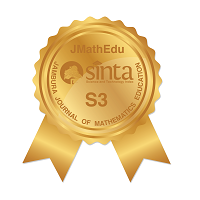Pengaruh Self-Efficacy dan Perhatian Orang Tua Terhadap Hasil Belajar Matematika Siswa SMP
Abstract
This study aims to: (1) Determine whether or not there is a significant influence of self-efficacy on mathematics learning outcomes for junior high school students in Toribulu District (2) To determine whether or not there is a significant influence of parental attention on mathematics learning outcomes for junior high school students in Toribulu District (3) ) Knowing whether or not there is a significant influence of self-efficacy and parental attention on the mathematics learning outcomes of junior high school students in Toribulu District. This research is an ex-post facto research. The population in this study were class VIII students of junior high schools in Toribulu District who were enrolled in the 2022/2023 academic year. The sample in this study were 64 students. The data analysis technique used is multiple regression analysis using SPSS 25. The results of this study indicate that at a significance level of 5% (1) there is a significant effect of self-efficacy on mathematics learning outcomes for junior high school students in Toribulu District of 13.2% (2 ) there is a significant effect of parental attention on mathematics learning outcomes for junior high school students in Toribulu District by 16.7% (3) there is a significant effect of self-efficacy and parental attention on mathematics learning outcomes for junior high school students in Toribulu District by 22.4%.
Keywords
Full Text:
PDFReferences
N. F. Handayani and M. Mahrita, "Faktor Penyebab Kesulitan Belajar Matematika pada Siswa Kelas IV di SDN Jawa 2 Martapura Kabupaten Banjar" J. PTK dan Pendidik., vol. 6, no. 2, 2021, doi: 10.18592/ptk.v6i2.4045.
I. A. Nafrin and H. Hudaidah, "Perkembangan Pendidikan Indonesia di Masa Pandemi Covid-19" Edukatif J. Ilmu Pendidik., vol. 3, no. 2, pp. 456-462, Apr. 2021, doi: 10.31004/edukatif.v3i2.324.
D. Gularso, H. Suryantari, H. A. Rigianti, and Martono, "Dampak Pembelajaran Daring Terhadap Kemampuan Anak Usia Sekolah Dasar" J. Pendidik. Dasar Nusant., vol. 7, no. 1, pp. 100-118, Jul. 2021, doi: 10.29407/jpdn.v7i1.15890.
L. Moliner, F. Alegre, and G. Lorenzo-Valentin, "The COVID-19 Pandemic's Impact on 9th Grade Students' Mathematics Achievement" Eur. J. Educ. Res., vol. 11, no. 2, pp. 835-845, Apr. 2022, doi: 10.12973/eu-jer.11.2.835.
A. Susanto, Teori Belajar dan Pembelajaran di Sekolah Dasar, 1st ed. Jakarta: Kencana Prenada Media Group, 2013.
D. H. Efendi, V. Sandayanti, and A. F. Hutasuhut, "Hubungan Efikasi Diri Dengan Regulasi Diri Dalam Belajar Pada Mahasiswa Fakultas Kedokteran Universitas Malahayati" ANFUSINA J. Psychol., vol. 3, no. 1, pp. 21-32, 2020, doi: 10.24042/ajp.v3i1.6046.
R. H. Rafiola, P. Setyosari, C. L. Radjah, and M. Ramli, "The effect of learning motivation, self-efficacy, and blended learning on students' achievement in the industrial revolution 4.0" Int. J. Emerg. Technol. Learn., vol. 15, no. 8, pp. 71-82, 2020, doi: 10.3991/ijet.v15i08.12525.
É. Szabó, K. Kóródi, E. Szél, and B. Jagodics, "Facing the Inevitable: The Effects of Coronavirus Disease Pandemic and Online Teaching on Teachers' Self-Efficacy, Workload and Job Satisfaction" Eur. J. Educ. Res., vol. 11, no. 1, pp. 151-162, Jan. 2022, doi: 10.12973/eu-jer.11.1.151.
E. Olivier, I. Archambault, M. De Clercq, and B. Galand, "Student Self-Efficacy, Classroom Engagement, and Academic Achievement: Comparing Three Theoretical Frameworks" J. Youth Adolesc., vol. 48, no. 2, pp. 326-340, 2019,
doi: 10.1007/s10964-018-0952-0.
N. Afni and J. Jumahir, "Peranan Orang Tua Dalam Meningkatkan Prestasi Belajar Anak" Musawa J. Gend. Stud., vol. 12, no. 1, pp. 108-139, Sep. 2020,
doi: 10.24239/msw.v12i1.591.
Kaharuddin, M. S. Ali, and A. Muhammad, "Pengaruh Efikasi Diri Dan Perhatian Orang Tua Terhadap Hasil Belajar Fisika Pada Peserta Didik SMA Negeri 3 Wajo" Dr. Diss. Univ. Negeri Makassar, vol. 3, pp. 103-111, 2020, http://eprints.unm.ac.id/id/eprint/18773.
Muniri, N. Wayuningtyas, and Choirudin, "Pengaruh Self-Efficacy dan Motivasi Terhadap Hasil Belajar Matematika Siswa Kelas VIII SMPN 1 Rejotangan" Prosding Semin. Nas. Teknol. Pembelajaran, no. 3, pp. 81-91, 2021,
https://www.snastep.com/proceeding/index.php/snastep/article/view/47.
Y. M. R. Marbun, "Pengaruh Perhatian Orang Tua Dan Motivasi Belajar Siswa Terhadap Hasil Belajar Matematika Siswa SMP" Mat. Paedagog., vol. V, no. 2, pp. 111-120, 2021, doi: https://doi.org/10.36294/jmp.1883.1601.
N. S. Sukmadinata, Metode Penelitian Pendidikan. Bandung: PT Remaja Rosdakarya, 2010.
Sugiyono, Metode Penelitian Kuantitatif, Kualitatif, dan Kombinasi (MIXED METHODS). Bandung: Alfabeta, 2015.
H. Hendriana, E. Eti Rohaeti, and U. Sumarmo, Hard Skills dan Soft Skills Matematik Siswa. Bandung: PT. Refika Aditama, 2018.
H. I. Labangsa, "Hubungan Antara Perhatian Orang Tua Dan Prestasi Belajar Matematika Siswa Kelas Ix SMP Negeri 20 Palu" Universitas Tadulako, 2021.
M. N. Ghufron and R. Risnawita S, Teori-teori Psikologi. Yogyakarta: Ar-Ruzz Media, 2010.
F. R. Pradia and D. K. Dewi, "HUBUNGAN ANTARA SELF-EFFICACY DENGAN ACADEMIC DISHONESTY PADA MAHASISWA" Character J. Penelit. Psikol., vol. 8, no. 8, 2021,
https://ejournal.unesa.ac.id/index.php/character/article/view/41680.
M. N. Ghufron and R. Risnawita S, Teori-teori Psikologi. Yogyakarta: Ar-Ruzz Media, 2014.
Slameto, Belajar dan Faktor-faktor yang Mempengaruhinya, Ed. Rev. Jakarta: Rineka Cipta, 2010.
S. S. Mentari, Y. Yuni, and N. Vioreza, "Peran Orang Tua terhadap Hasil Belajar Matematika Materi Aljabar di Masa Pandemi COVID-19" J. Instr. Math., vol. 2, no. 2, pp. 55-63, 2021, doi: 10.37640/jim.v2i2.1021.
Mentari, S. S., Yuni, Y., & Vioreza, N. (2021). Peran Orang Tua terhadap Hasil Belajar Matematika Materi Aljabar di Masa Pandemi COVID-19. Journal of Instructional Mathematics, 2(2), 55-63. https://doi.org/10.37640/jim.v2i2.1021
Hartati, I., Suciati, I., & Wahyuni, D. S. (2021). Pengaruh Efikasi Diri Terhadap Hasil Belajar Matematika : Meta Analisis. Guru Tua : Jurnal Pendidikan Dan Pembelajaran, 4(2), 49-56. https://doi.org/https://doi.org/10.31970/gurutua.
DOI: https://doi.org/10.37905/jmathedu.v4i2.21107
Refbacks
- There are currently no refbacks.
Copyright (c) 2024 Jambura Journal of Mathematics Education

This work is licensed under a Creative Commons Attribution-NonCommercial 4.0 International License.
Jambura Journal of Mathematics Education has been indexed by:
EDITORIAL OFFICE OF JAMBURA JOURNAL OF MATHEMATICS EDUCATION |
 | Department of Mathematics, Universitas Negeri Gorontalo Jl. Prof. Dr. Ing. B. J. Habibie, Moutong, Tilongkabila, Kabupaten Bone Bolango, Gorontalo 96554, Indonesia |
 | Email: [email protected] |
 | +6285255745923 (Call/SMS/WA) |
 | Jambura Journal of Mathematics Education (JMathEdu | eISSN: 2721-7477) by Department of Mathematics Universitas Negeri Gorontalo is licensed under a Creative Commons Attribution-NonCommercial 4.0 International License. Powered by Public Knowledge Project OJS. |



















